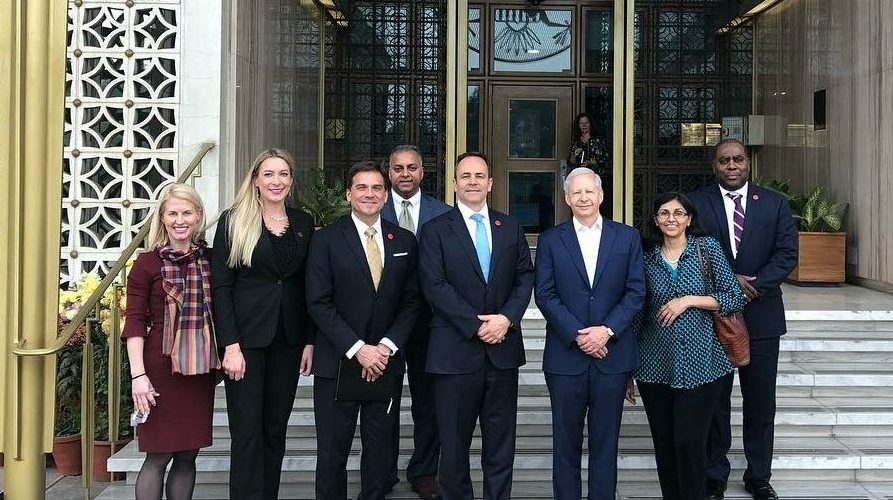Last week, I joined a delegation of senior business leaders from American and Indian companies to India with the goal of strengthening economic ties between the two countries. Over the last decade, trade between the US and India tripled to $125 billion with exponential growth expected. With 1.35 billion consumers and a growth rate of 8.2%, India now holds the title of fastest growing economy in the world, surpassing China in 2018.
Led by Kentucky Governor Matt Bevin, and orchestrated by the US India Business Council (USIBC), the delegation was comprised of executives from Amazon, UPS, IBM, KPMG and other global companies. In addition to promoting bilateral trade relations between the US and India, the delegation aimed to highlight the importance of strategic and commercial partnerships between the countries.
Arizona’s relationship with India has become increasingly important in recent years as trade levels between nation and state rise. Imported goods from India to Arizona totaled $238 million in 2017, marking a steady increase since 2011. During the same year, Arizona exported $157 million in goods and services to India, a dramatic increase of 38 percent from 2016 to 2017. Arizona exports to India include civilian aircraft, electronics and semiconductors, defense equipment, machinery and medical devices.
In the past year, Arizona has seen an influx of Indian investment into the state.
In August 2018, Indian engineering firm Axiscades announced plans to hire more than 300 people in Southern Arizona. The firm’s CEO, Mritunjay Singh, called Caterpillar the “primary customer” for Axiscades.
In September 2018, Indian technology giant Infosys announced plans to open an innovation hub in Arizona, creating 1,000 new jobs by 2023. The Arizona hub will have a special focus on autonomous technologies, IOT, data science and cyber security.
I had the opportunity to speak about these trends at India’s largest biennial conference of its kind, Vibrant Gujarat Global Summit 2019. The Summit was held in Gujarat, India’s westernmost state and home to 62.7 million residents. During my session I discussed Arizona’s burgeoning economy and the growth of our advanced manufacturing sector – both attributable to smart policies put in place by Arizona Governor Doug Ducey.
I was also honored to participate in an MOU signing ceremony during the Summit with the Hon. Chief Minister of the State of Gujarat, Vijay Rupani. The MOU reinforces commitments from the business community in Arizona and India to continue pursuing cross-border trade activities in both countries.
The delegation had a unique opportunity to meet with Indian Prime Minister Narendra Modi during his three-day visit to his home state of Gujarat, where he inaugurated the 9th edition of the Vibrant Gujarat Summit. Modi, who is facing re-election this year, delivered a message revolving mostly around his administration’s accomplishments which include implementation of a new Goods and Services Tax (GST), bankruptcy resolution reforms and improvements made under India’s Ease of Business Initiative.
While Modi struck a par-for-the-course chord, India’s richest person, Mukesh Ambani, managed to ruffle feathers with his remarks. Ambani, who serves as chairman and managing director of Reliance Industries Ltd., put an end to widespread speculation with his announcement at the Summit to expand operations into the e-commerce space. Ambani, who has a net worth estimated at $48.4 billion dollars, urged Modi to lead the fight against “data colonization.”
Ambani’s announcement is seen as an open challenge to Amazon India and Walmart-owned Flipkart, both of which face unprecedented levels of uncertainty in the country. In December 2018, the Indian government issued new e-commerce investment rules banning companies from selling products via firms in which they have an equity interest.
The rules, which kick in February 1, also bar the companies from making deals with sellers to sell exclusively on their platforms. The policy would force companies to change their business structures in the country and raise operational costs.
After the Summit, the delegation continued on to New Delhi where we met with US Ambassador to India Kenneth Juster and other foreign officials to discuss the increasingly complex global trade environment. While progress is being made to ease tensions, unresolved issues remain.
In addition to India’s new e-commerce rules, the following issues have the greatest potential to cause disruption among Arizona exporters:
Section 232 Tariffs: The US Administration has announced plans to impose additional tariffs on aluminum and steel from India. The Government of India has threatened to retaliate by placing tariffs on a host of US products imported into India. To date, neither of these tariffs have taken effect.
The USIBC, Arizona Chamber of Commerce & Industry, Arizona Manufacturers Council and scores of other national and international groups oppose the tariffs.
General System Preferences (GSP): In response to trade issues (particularly related to medical devices and diary), the U.S. Trade Representative is considering a petition to withdraw GSP for India. The GSP, the largest and oldest US trade preference program, is designed to promote economic development in developing countries by allowing certain products to enter the U.S. market duty-free.
Data Localization: A trend towards data localization in India has created cause for concern in international markets. Data localization requirements and policies hinder the free flow of information, create cyber risks and add barriers to competition and innovation.
With foreign direct investment on the rise, and a growing trade portfolio, Arizona’s relationship with the world’s largest democracy has never been more important.
Allison Gilbreath is the Executive Director of the Arizona Manufacturers Council.
















Add comment